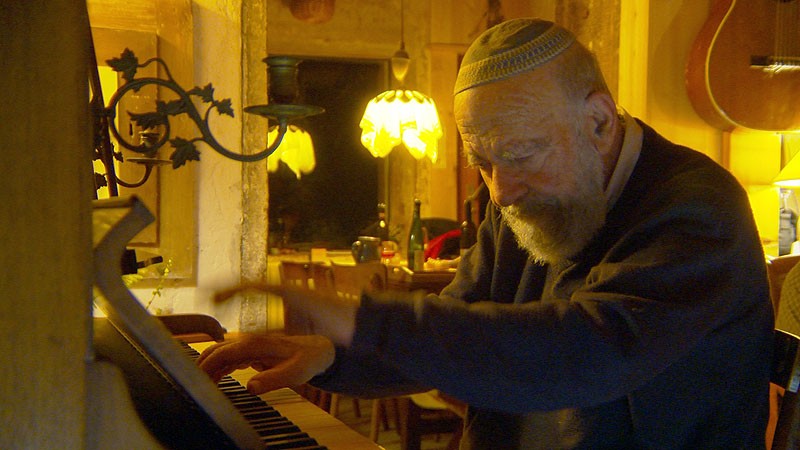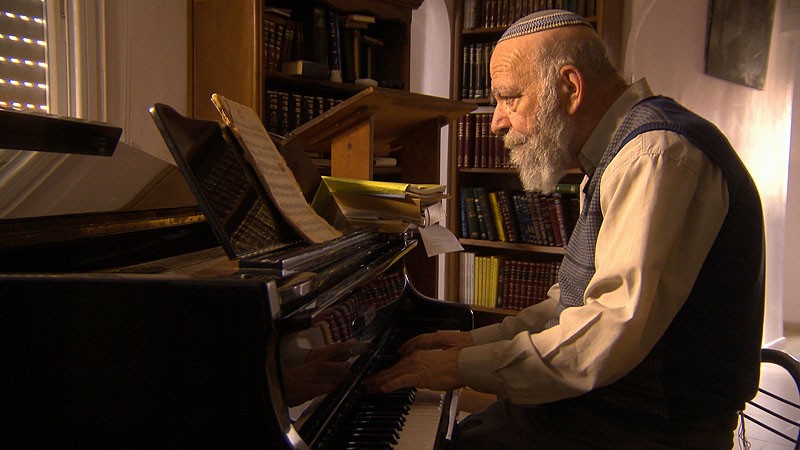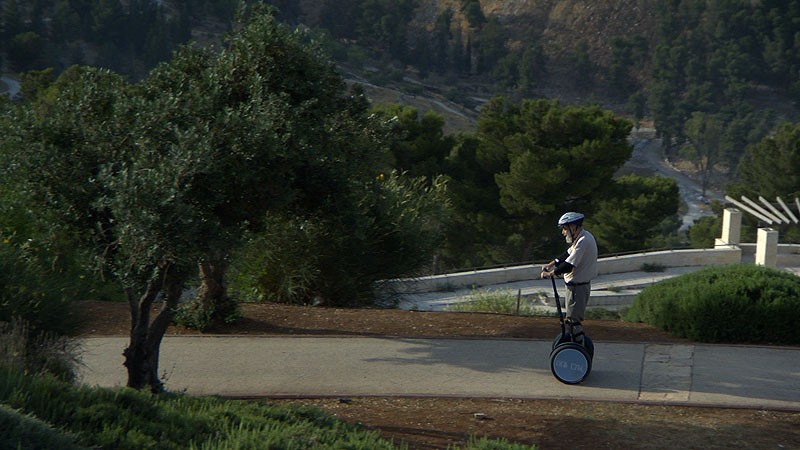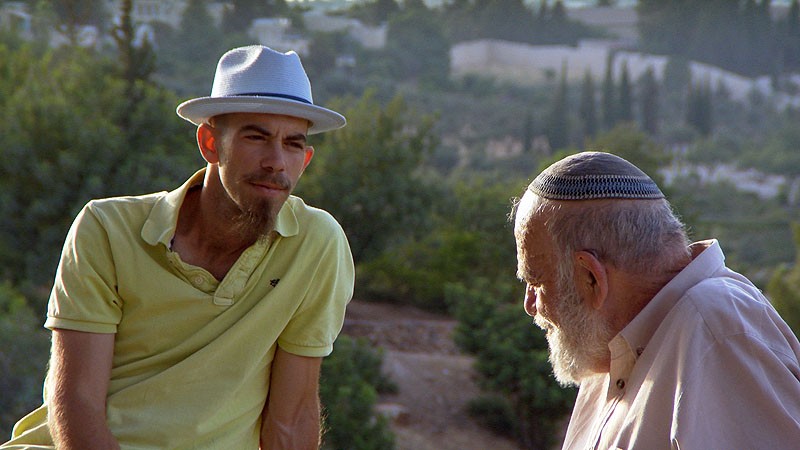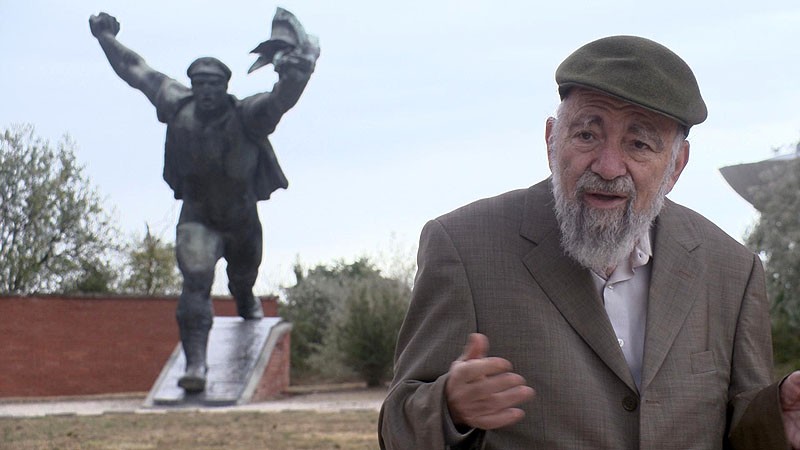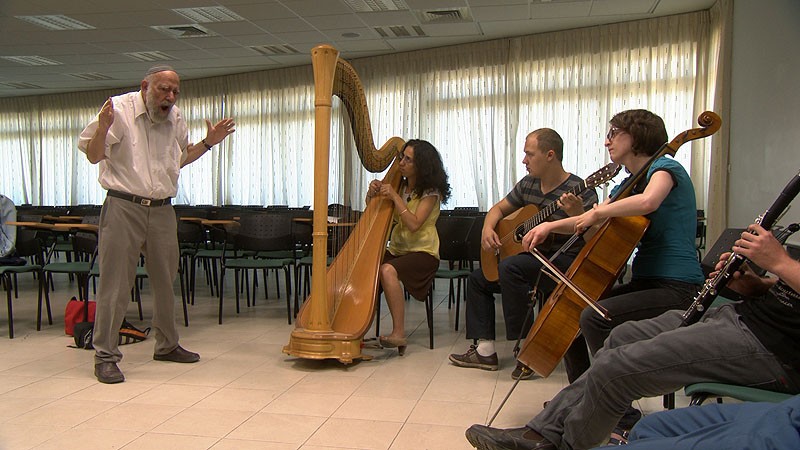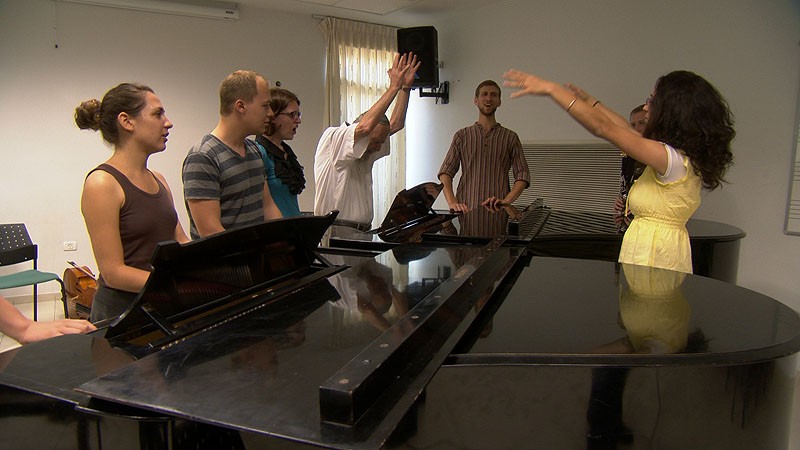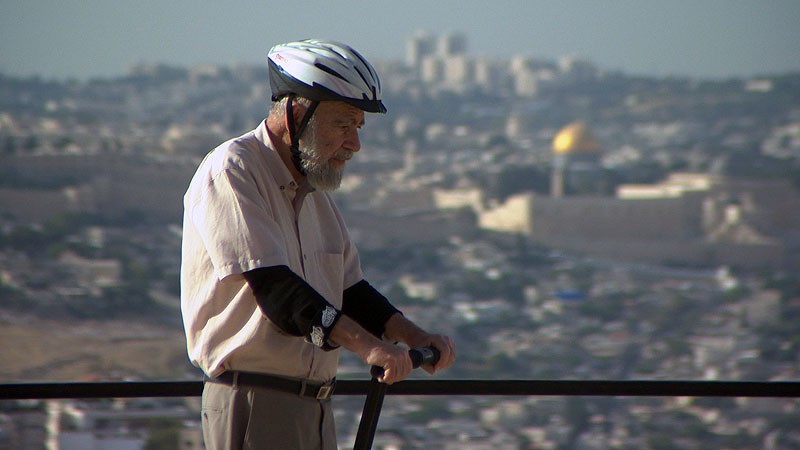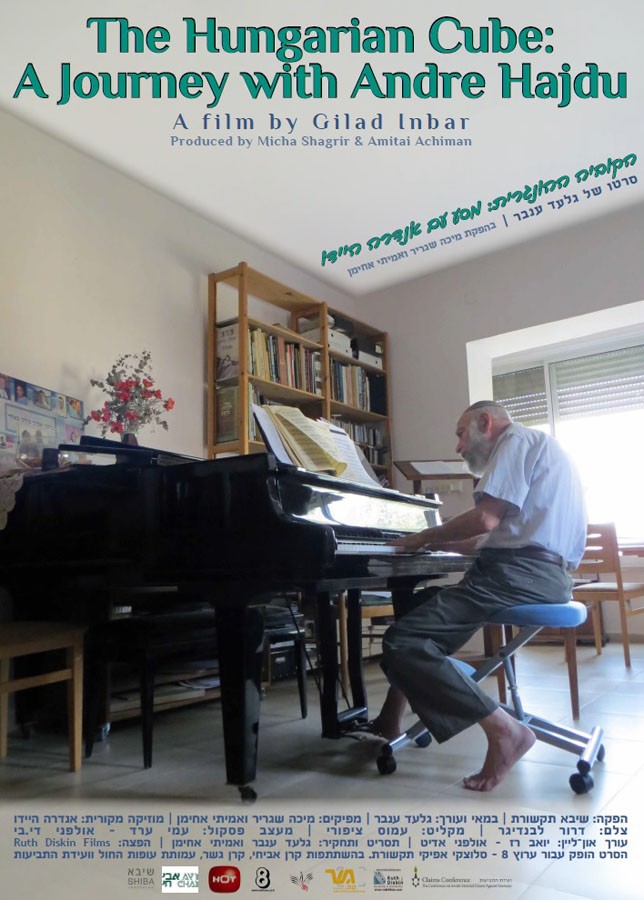Israel Prize winner, composer Andre Hajdu, is a multi-faceted man. Just like the Hungarian Rubric’s cube where a new color is revealed when you turn it at different angles, so is Hajdu’s complex and rich biography.
Throughout his life, Andre positioned himself as an outsider and has been able to use those contradictions as a tool for growth and a well for inspiration. He combines an uncompromising Orthodox religious life with a bold avant-garde artistic expression. This is a choice that often puts him in an awkward position in the religious world in which he lives as well as in the circles of composers and academics amongst whom he works.
The choice to live as he does creates identity issues for his six sons – and none of them has chosen to continue on his unique path. Some of them have chosen a completely secular life-style, while others live religious Orthodox lives – all the while keeping a safe distance from their father’s dangerous fires of creativity.
In THE HUNGARIAN CUBE we are presented with the complex portrait of Andre Hajdu. We get to know his work, his circuitous life-path, along with his sons and his wife Ruth, a convert to Judaism, who allows him to soar.
Synopsis
Israel Prize winner, composer Andre Hajdu, is a multi-faceted man. Just like the Hungarian Rubric’s cube where a new color is revealed when you turn it at different angles, so is Hajdu’s complex and rich biography.
Throughout his life, Andre positioned himself as an outsider and has been able to use those contradictions as a tool for growth and a well for inspiration. He combines an uncompromising Orthodox religious life with a bold avant-garde artistic expression. This is a choice that often puts him in an awkward position in the religious world in which he lives as well as in the circles of composers and academics amongst...
Festivals
- Verzio International Film Festival, Hungary, 2014
- Budapest Israel Film Festival, Hungary, 2014
- Hungarian Film Festival in Los Angeles, USA, 2014
- Banff Centre, Canada, 2014
Press & Links:
The Hungarian Cube - A Journey with Andre Hajdu is a sweet and tender film, with tidbits of Hajdu's early life delivered through conversations and remembrances with friends and family members. Along the way, while meeting Hajdu's children and visiting with his wife's sister, you discover that although an Orthodox Jew, Hajdu's life has been anything but conventional. In addition, his sons have chosen lives along the full spectrum of Judaism, from one son being almost an atheist, to another who became Haredi (ultra-orthodox). This is not unlike Hajdu's life story. As a youth he was a nonreligious Jew, and it was only as he matured that he embraced modern Orthodoxy. In a way, it is as if each son represents one aspect of Hajdu's life, highlighting the complexity hidden by the casual demeanor that he presents to the world.
For the entire review at The Jewisheye.com, check: http://www.thejewisheye.com/hajdu.html
"This documentary explores the life of Israeli composer Andre Hajdu, a student of Kodály (who encouraged him to go out into villages and gather folk music) and the winner of the 1997 Israeli Prize for Music."
For the entire review by Anne Shelley, Music/Multimedia Librarian, Milner Library, Illinois State University/EMRO, check:http://libweb.lib.buffalo.edu/emro/emroDetail.asp?Number=5304
The Musical Score of Life
Impressions from the film THE HUNGARIAN CUBE which documents the relationship between composer Andre Hajdu and his six sons.
Andre Hajdu is an 81 year old Israeli musician, ethnomusicologist and composer. He is a religious man and the father of 6 sons. The documentary “The Hungarian Cube” which was broadcast last night on Channel 8 offers a fascinating look at his family which seems to carry the entire Israeli experience on its back. The film is quite special, as is its subject.
The charm of the film stems from its avoidance of pretense. Directed by Gilad Inbar and produced by Micha Shagrir, “The Hungarian Cube” does not try to capture the entire complexity of the Hajdu family, but to illustrate a point by taking a look at his relationship with his sons and a few of his friends. These glances consist of six meetings with the various sons which are conversations that deal with Hajdu’s past and areas of interest to his sons. A ray of light is shone on the father-sons relationship. But it is only a partial ray as the film very cleverly leaves a space for mystery. The question that lingers after viewing the film is how can one family with such a strong and charismatic father end up with six such different sons. And to my mind, each of the relationships with each of the sons is quite different. Six sons, six different worlds
Ha’aretz, July 5 2013/ Hagai Hitron
Documentary film at its best: the idea of telling the story of the life of composer Andre Hajdu through meetings with his six sons is brilliant and proves to be excellent.
It allows us to really delve into this special personality and then leave reflecting about issues which the film raises - mainly about people who are artists, about the relationship between fathers and sons – a topic that almost never fails– and which here is expressed most effectively.
This interesting and talented man touches those who meet him –and by extension, the viewers as well.
The film is well made; the camera work is meticulous and the editing is organized and clear. The music of Andre Hajdu is integrated nicely and in the right quantity into the film.
Sharon Shamir – Producer & Lector at Gesher Multicultural Fund
A Great Israeli Composer: Andre Hajdu
The Hungarian Cube: A Journey with Andre Hajdu (directed by Gilad Inbar) is a new bio-documentary, providing an intimate look at one of Israel's foremost composers, a winner of the Israel Prize for Music (1997). Young Israeli musicians were brought up on his music -- I recall my daughter playing some of his pieces during her years as a clarinetist in the Jerusalem Youth Orchestra.
For the entire review by Amy Kronish, check: http://www.israelfilm.blogspot.co.il/2013/06/a-great-israeli-composer-andre-hajdu.html
Festivals
- Verzio International Film Festival, Hungary, 2014
- Budapest Israel Film Festival, Hungary, 2014
- Hungarian Film Festival in Los Angeles, USA, 2014
- Banff Centre, Canada, 2014
- Holocaust Film Series, Melbourne, Australia, 2014
- The Jerusalem Jewish Film Festival, 2013
Educational
- Library of the Jewish Theological Seminary
- Yale University
- University of Pennsylvania
- Harvard University
- Arizona State University
- Duke University
- Yad Va'Shem Audiovisual Library
